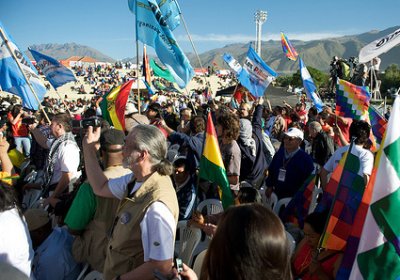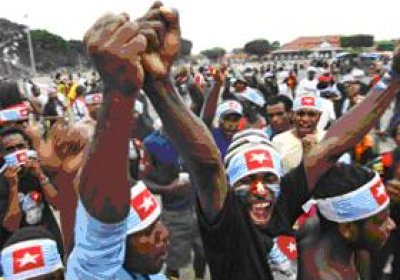Australia’s big banks would like you to think they care about climate change and the environment. But don’t believe them.
A new report by Greenpeace Australia has revealed the “big four” — Westpac, ANZ, Commonwealth and NAB — are investing billions of dollars in Australia’s dirty coal boom.
Burning coal for energy is Australia’s single biggest contributor to climate change, making more than a third of the country’s greenhouse gas pollution. Australia is also the world’s biggest coal exporter — and the export trade is growing fast.
Environment
About 40 people attended the launch of a No New Coal campaign by Safe Climate Perth on October 10. The launch took place as part of the 350.org “global work party” — an international day of action involving more than 7000 events around the world.
As part of the campaign, activists aim to get 10,000 signatures in 10 weeks on a petition opposing new coal developments in Western Australian.
No legally-binding agreement to cut greenhouse gas emissions will be made at this year’s big United Nations climate conference in Cancun, Mexico from November 29 to December 10. And that’s just the way the rich nations want it.
Few world leaders are even expected to turn up to the Cancun talks. For months, key players have tried to dampen down public hopes that the summit will mark a shift away from business as usual.
The British Guardian columnist George Monbiot wrote on September 20 that it was time for climate action campaigners to accept the UN process was dead.
Despite carefully-crafted appearances to the contrary, projects like the Extractive Industries Transparency Initiative (EITI) are no solution to the problems that confront the colonised “developing” world.
Endemic corruption, environmentally unsustainable development and spiralling income inequality are inseparable from the process of capitalist global expansion, which EITI and other corporate-funded front organisations only serve to legitimise.
The following call was issued by Canadian-based non-government organisations, community groups and individuals to join the growing global movement for climate justice. It calls for mobilising in the lead-up and during the United Nations climate summit in Cancun, Mexico, over November 27-December 10.
Beginning in April, so-called peace talks have taken place between some conservation groups and timber industry stakeholders about the future of the Tasmanian timber industry. Both sides have painted the talks as a once in a lifetime opportunity to “end the forest wars”.
Environment Tasmania (ET) director Phill Pullinger told the May 13 Australian: “We've had 30 years of worsening trench warfare in Tassie over forests and now is the time and the opportunity to essentially solve the forest conflict — and solve it properly.”
Gippsland unions and community organisations took part in the fourth in a series of “transition jobs seminars”. The seminar took place on October 13 under the auspices of the Gippsland Trades and Labour Council (GTLC) and the Royal Melbourne Institute of Technology (RMIT).
It dealt with the region’s current skills base in brown-coal mining, dairy and other industries, and the sort of training needed to skill workers for environmentally sustainable production.
The “Switch off Hazelwood, Switch on Renewable Energy” protest targeted Australia’s dirtiest coal-fired power station, in Victoria’s Latrobe Valley, on October 10. It was successful but muted in contrast to its predecessor in 2009.
The mood was no less festive, but this year, there was no climate camp, no mass actions and no arrests.
The deluge of rain hitting south-east Australia has broken the 10-year drought that brought the Murray Darling Basin and many farming communities to the brink of disaster.
A few months of wet weather have brought the wetlands back to life. The rivers are flowing again, and farmers might even be able to harvest a bumper crop if they can beat the mass locust hatchings.
In August, Truthout conducted soil and water sampling in Pass Christian Harbor, Mississippi, on Grand Isle, Louisiana, and around barrier islands off Louisiana’s coast to test for the presence of oil from BP’s Macondo Well.
Laboratory test results from samples taken reveal very high concentrations of oil in the soil and water. These results contradict consistent claims by the federal government and BP since August that much of the Gulf of Mexico is now free of oil and safe for fishing and recreational use.
West Papuan leaders have rejected the possibility of talks with the Indonesian government until it acknowledges human rights abuses and ensures economic development, the October 5 Jakarta Globe said.
Indonesia has claimed West Papua as its territory since a fraudulent vote by handpicked Papuans in 1969. It continues to deny Papuans the right to self-determination, repressing expressions of support for Papuan independence.
Herman Awom of the Papuan People’s Council told the Globe: “We don’t want to talk to Jakarta because Jakarta never wants to talk to us.
“No powerlines through koala habitat”, was the main slogan of a protest rally of people from the Logan area, the Gold Coast and the Sunshine Coast outside the Queensland parliament on October 7. The protesters had gathered to present a 2000-strong petition opposing electricity company, Energex, plans to upgrade powerline infrastructure near their homes.
Veto Energex Towers Organisation (VETO) spokesperson Laurie Koranski said they did not believe the impacts of the plan had been fully investigated. VETO has already lobbied successfully to have some powerlines placed underground.
- Previous page
- Page 275
- Next page











